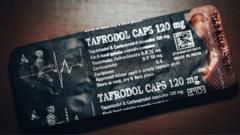India has officially prohibited the manufacture and export of two potent opioids, tapentadol and carisoprodol, in a decisive response to a BBC investigation that uncovered their role in a public health crisis plaguing parts of West Africa. Dr. Rajeev Singh Raghuvanshi, India's Drugs Controller General, confirmed the ban in a letter that noted the immediate cessation of permissions for the manufacturing and distribution of these addictive drugs.
The investigation revealed that a Mumbai-based pharmaceutical company, Aveo, was illegally exporting a dangerous combination of these opioids to countries including Ghana, Nigeria, and Cote D'Ivoire. Following the findings, India's Food and Drug Administration (FDA) conducted a raid on Aveo's factory in Mumbai, seizing all of its stock. The circular released by Dr. Raghuvanshi was explicitly linked to the BBC investigation, emphasizing concerns about drug addiction and its adverse effects on the population.
Tapentadol, a powerful opioid, coupled with carisoprodol, a highly addictive muscle relaxant banned in Europe, poses significant health risks such as seizures and respiratory distress. Their illegal combination is not sanctioned for use worldwide, yet they continue to gain popularity as street drugs in numerous West African markets due to low prices and easy accessibility.
Recent export data has indicated that Aveo Pharmaceuticals and its sibling entity, Westfin International, have shipped millions of these tablets to various West African nations, particularly Nigeria. With a staggering population of 225 million, Nigeria has emerged as a major market for these pills, where an estimated four million citizens are engaged in opioid misuse, according to national statistics.
The investigation involved an undercover journalist masquerading as a businessman seeking to distribute opioids in Nigeria, who infiltrated an Aveo factory. The footage captured a director, Vinod Sharma, acknowledging the harmful nature of their products while discussing their profitability. Despite this, Aveo Pharmaceuticals refrained from commenting on the investigation's release.
In response to these alarming revelations, India’s FDA reports that it has seized Aveo's entire inventory and halted all further production, with intentions to pursue legal ramifications against the company. The agency has pledged to intensify inspections and take stringent regulatory measures to thwart illegal drug trade that jeopardizes India's international reputation and public health.
This ongoing situation highlights the urgent need for international cooperation in the fight against the opioid crisis, as countries grapple with the consequences of unregulated pharmaceuticals.
The investigation revealed that a Mumbai-based pharmaceutical company, Aveo, was illegally exporting a dangerous combination of these opioids to countries including Ghana, Nigeria, and Cote D'Ivoire. Following the findings, India's Food and Drug Administration (FDA) conducted a raid on Aveo's factory in Mumbai, seizing all of its stock. The circular released by Dr. Raghuvanshi was explicitly linked to the BBC investigation, emphasizing concerns about drug addiction and its adverse effects on the population.
Tapentadol, a powerful opioid, coupled with carisoprodol, a highly addictive muscle relaxant banned in Europe, poses significant health risks such as seizures and respiratory distress. Their illegal combination is not sanctioned for use worldwide, yet they continue to gain popularity as street drugs in numerous West African markets due to low prices and easy accessibility.
Recent export data has indicated that Aveo Pharmaceuticals and its sibling entity, Westfin International, have shipped millions of these tablets to various West African nations, particularly Nigeria. With a staggering population of 225 million, Nigeria has emerged as a major market for these pills, where an estimated four million citizens are engaged in opioid misuse, according to national statistics.
The investigation involved an undercover journalist masquerading as a businessman seeking to distribute opioids in Nigeria, who infiltrated an Aveo factory. The footage captured a director, Vinod Sharma, acknowledging the harmful nature of their products while discussing their profitability. Despite this, Aveo Pharmaceuticals refrained from commenting on the investigation's release.
In response to these alarming revelations, India’s FDA reports that it has seized Aveo's entire inventory and halted all further production, with intentions to pursue legal ramifications against the company. The agency has pledged to intensify inspections and take stringent regulatory measures to thwart illegal drug trade that jeopardizes India's international reputation and public health.
This ongoing situation highlights the urgent need for international cooperation in the fight against the opioid crisis, as countries grapple with the consequences of unregulated pharmaceuticals.





















